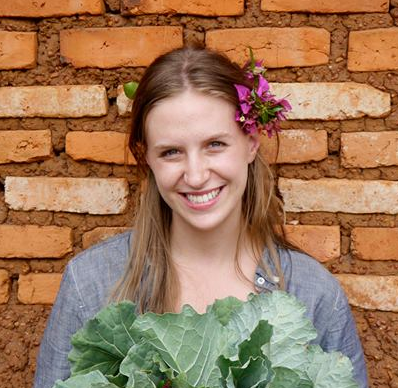Through a year-long, paid fellowship with Global Health Corps, Michaela discovered an unexpected marriage between her passion for social justice and her love of food. Global Health Corps, a non-profit that provides opportunities for young professionals from diverse backgrounds to work in health-related organizations seeking new thinking and innovative solutions, placed Michaela at Gardens for Health International in Rwanda. Gardens for Health works to transform the way that malnutrition is treated by using agriculture and food education as a key driver of better health. As an alum, Michaela has remained at her job at Gardens for Health International, working to create sustainable social change by promoting agricultural skills, health knowledge and, of course, great food.
If you are eager to contribute in the same way Michaela has, check out the current fellowship opportunities with Global Health Corps.
When did you know that you wanted to work in food?
Sometimes I don't know if I found food or if food found me. In college, I kept finding myself assigned to nutrition-focused projects during public health courses and internships. I already knew that I wanted to dedicate my career to global health and social justice - so the more I learned about disparities in access to healthy food and the associated poor outcomes in health, the more I became interested in working in food. I see it is as one of the most important and interesting ways to address health inequities today. Plus, I like the fact that good food and community can also be a source of physical and spiritual health.
How did you get your current good food job?
I got my current job with Gardens for Health International through Global Health Corps - an amazing fellowship program that places fellows from all over the world in leadership positions within organizations that are working towards global health equity. During the yearlong program, Global Health Corps provides fellows with the professional development opportunities and dedicated community that enables them to maximize their impact in their fellowship positions and throughout their career.
How did your previous work or life experience prepare you for a good food job?
As an undergraduate, I wrote my thesis on food deserts in St. Louis, Missouri and it was a really great opportunity for me to understand the complexity of our food systems. Everything from transforming agricultural practices to discriminatory housing practices determine who has access to what kinds of food and where. That understanding definitely helped me thrive in my current position with Gardens for Health International. Gardens for Health addresses child malnutrition in Rwanda through a comprehensive model that provides families with the agricultural skills and health knowledge to cultivate their own source of good nutrition.
What was the greatest obstacle you had to overcome in pursuing your Good Food Job dream?
Working in Rwanda and witnessing the high levels of malnutrition amongst children here is challenging. Without proper nutrition, many children lack that vivid excitement and curiosity for life. At times I feel angry, sad, frustrated, or even hopeless. But then there are little moments - a child starts getting much healthier, a mother dedicates energy to growing nutritious food for her children, a community rallies to help out a family in need - that inspire and give hope.
Also, the Global Health Corps community has been a great source of support. Global Health Corps is very intentional about helping their fellows and alums build a strong sense of community with other fellows and alums, because they know that this work is hard, and we will need to rely on each other if we want to remain in this work.
What can you identify as the greatest opportunities in food right now?
I think there are a lot of great movements going on within food right now. In the United States, there's really a push towards eating local and understanding where your food comes from. And then at the same time, people are becoming much more aware of food deserts and the lack of equitable access to food. I am looking forward to seeing these movements really connecting to build a strong system that is both sustainable and just, that can make both people and the planet healthy.
If you could be compensated for your work with something other than money, what would it be?
I guess the obvious answer here would be food, right? But I suppose it's true! I would like to be compensated for my work with good food and strong community. And the opportunity to travel!









